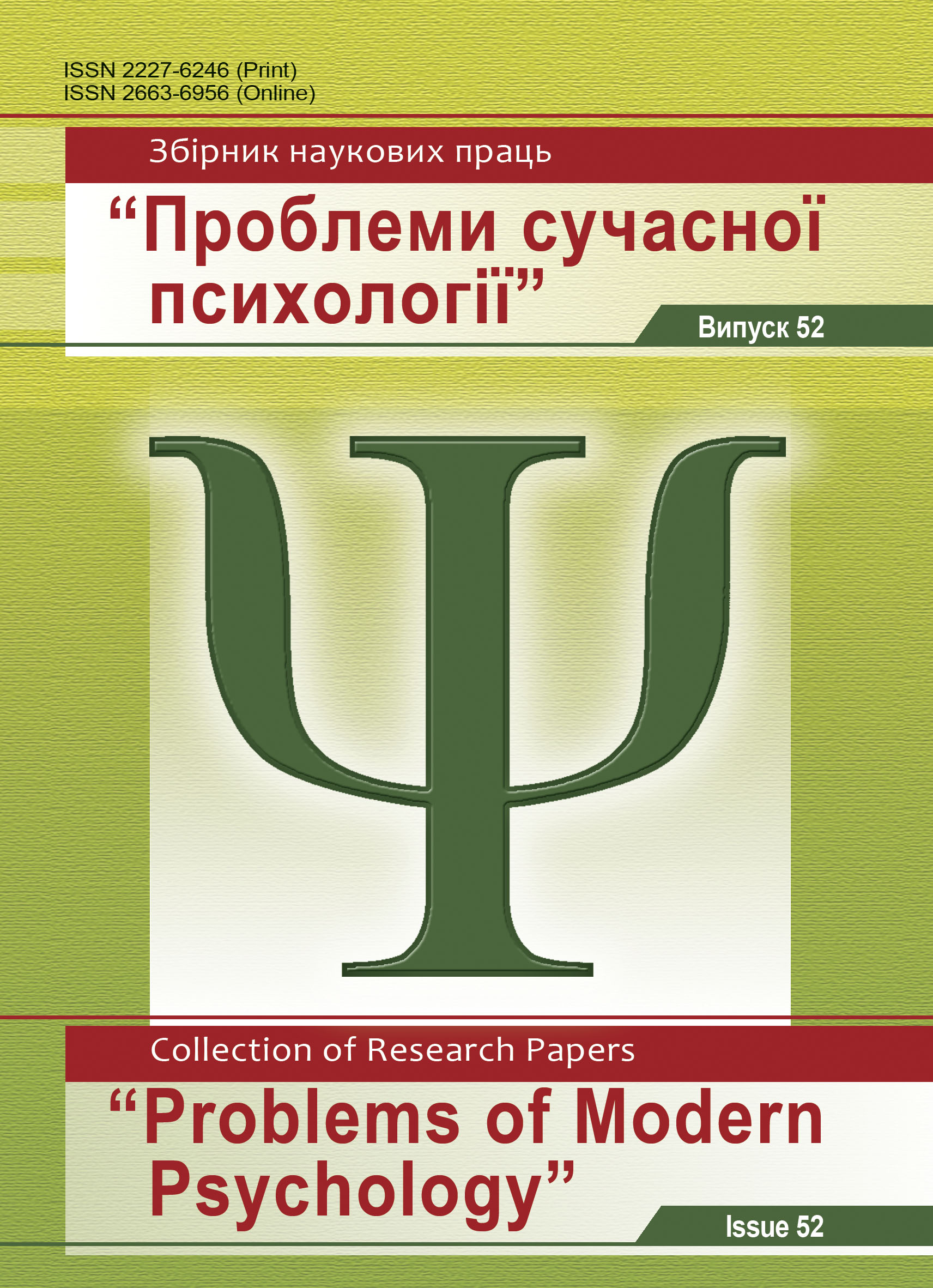Розвиток творчості вчителя шляхом використання автентичного матеріалу на уроках
DOI:
https://doi.org/10.32626/2227-6246.2021-52.182-203Ключові слова:
творчість учителя, автентичний матеріал, творча діяльність, фрустрація, стадія інкубації, інсайт у творчій діяльності, знаходження рішенняАнотація
Мета дослідження – показати значення прислів’їв для розвитку творчості вчителя шляхом використання автентичного матеріалу на уроках, що може передбачати: встановлення креативних явищ і властивостей; їх оцінку; окреслення особливостей креативного матеріалу. За допомогою творчого матеріалу можливий розвиток творчої здібності вчителя шляхом використання автентичного матеріалу на уроках.
Для розв’язання поставлених у роботі завдань використано такі теоретичні методи дослідження: категоріальний, структурно-функціональний, аналіз, систематизація, моделювання, узагальнення.
Результати дослідження. Для розвитку креативності вчителя шляхом використання автентичного матеріалу на уроках базовим має бути процедурний підхід. Цей підхід визначає творчу діяльність як суто внутрішній процес, орієнтований на людські ідеї, в результаті існування яких відбувається стимулювання творчої активності вчителя. Автентичний матеріал завдяки своїй «зовнішній формі» сприятиме розвитку творчості вчителя.
Висновки. Виокремлено рівні перебігу творчої діяльності й запропоновано розглядати цю діяльність із двох позицій: як процес, що відбувається в певний момент часу, і як процес у широкому соціальному й історичному контекстах. З огляду на процесуальний підхід також виокремлено основні характеристики творчого процесу: творчість характеризується як ідіосинкратичний, непередбачуваний процес, що вирізняється несистемністю і випадковістю. У творчому процесі виокремлено такі основні етапи: 1. Підготовка до творчості. Цей етап безпосередньо пов’язаний із бажанням суб’єкта творчої діяльності змінити існуючу соціальну ситуацію, яка за деякими причинами перестала його задовольняти і характеризується свідомими зусиллями з метою пошуку дієвого виходу з проблемної ситуації. 2. Фрустрація у процесі виконання творчої діяльності. Перехід на зазначений етап відбувається в той момент, коли, проаналізувавши весь обсяг інформації, а також опрацювавши всі варіанти розв’язання проблеми, суб’єкт творчості, тим не менше, не знаходить засобів і шляхів для її розв’язання. 3. Інкубація в творчій діяльності. Етап інкубації пов’язаний із несвідомим розв’язанням людиною певної проблеми, в ході чого активізується ліва півкуля головного мозку. 4. Інсайт у творчій діяльності. Інсайт – це короткочасний, але досить емотивний етап творчого процесу, момент надходження у сферу свідомості рішення щодо розв’язання проблеми. Цей етап характеризується бурхливими позитивними емоціями, пожвавленням, іноді навіть ейфорією. 5. Знаходження рішення. Знаходження рішення в результаті верифікації гіпотез є завершальним етапом творчого процесу, в ході якого відбувається перевірка істинності отриманого рішення з використанням логічних засобів, причому інтрига цього етапу постає у можливості помилкової верифікації сформульованих гіпотез.
Посилання
Honcharuk, Nataliia, & Onufriieva, Liana (2018). Psykholohichnyi analiz rivniv pobudovy komunikatyvnykh dii [Psychological analysis of levels of communicative actions’ constructing]. Psykholinhvistyka. Psikholingvistika. Psycholinguistics: Zb. nauk. prats DVNZ «Pereiaslav-Khmelnytskyi ped. un-t imeni Hryhoriia Skovorody» – Psycholinguistics. Psycholinguistics. Psycholinguistics: Collection of Scientific Papers of the Pereiaslav-Khmelnytskyi Hryhorii Skovoroda State Pedagogical University, 24 (1), 97–117. Pereiaslav-Khmelnytskyi : FOP Dombrovska Ya. M. DOI 10.31470/2309-1797-2018-24-1-97-117 [in Ukrainian].
Amabile, T. M., Conti, H., Lazenby, J., & Herron, M. (1996). Creative environment at work. The Academy of Management Journal, 36, 1154–1184.
Amabile, Т. М. (1983). The social psychology of creativity. New York : Springer-Verlag.
Boden, M. A. (1991). The creative mind: myths and mechanisms. New York : Basic Books; London : Abacus.
Collins, M. A., & Amabile, T. M. (1999). Motivation and creativity. Hand¬book of Creativity, (pp. 297–313). R. Sternberg (Ed.). Cambridge.
Ekvall, G. (1997). Organizational conditionals and levels of creativity. Creativity and innovation management, 6, 195–205.
Enkvist, N. E. (1990). Literary Pragmatics: On the Interpretability of Texts in General, and Literary Texts in Particular. R. D. Sell (Ed.). New York; London : Longman.
Gehrmann, S. (2015). Bildungskonzepte und Lehrerbildung in europäischer Perspektive. Münster; New York : Waxmann [in German].
Mykhalchuk, Nataliia, & Ivashkevych, Eduard (2018). Psycholinguistic features of the development of social intelligence of the teacher. Psykholinhvistyka. Psikholingvistika. Psycholinguistics: Zb. nauk. prats DVNZ «Pereiaslav-Khmelnytskyi ped. un-t imeni Hryhoriia Skovorody» – Psycholinguistics. Psycholinguistics. Psycholinguistics: Collection of Scientific Papers of Pereiaslav-Khmelnytskyi Hryhorii Skovoroda State Pedagogical University, 23 (1), 242–257. Pereiaslav-Khmelnytskyi : FOP Dombrovska Ya. M. DOI https://doi.org/10.5281/zenodo.1211618 (ISSN 2415-3397, Index Copernicus, Web of Science).
Mykhalchuk, Nataliia, & Kryshevych, Olga (2019). The peculiarities of the perception and understanding of Sonnets written by W. Shakespeare by the students of the Faculty of Foreign Languages. Psycholinguistics. Psykholinhvistyka. Psikholingvistika: Zb. nauk. prats DVNZ «Pereiaslav-Khmelnytskyi ped. un-t imeni Hryhoriia Skovorody» – Psycholinguistics. Psycholinguistics. Psycholinguistics: Collection of Scientific Papers of Pereiaslav-Khmelnytskyi Hryhorii Skovoroda State Pedagogical University, 26 (1), 265–285. Pereiaslav-Khmelnytskyi : FOP Dombrovska Ya. M. DOI 10.31470/2309-1797-2019-26-1-265-285.
Zubiashvily, I., Kocharian, A., Lunov, V., Barinova, N., & Onufriieva, L. (2020). Phenomenon of money: Social and psychological essence and functions. International Journal of Psychosocial Rehabilitation, 24 (3), 1629–1642. DOI 10.37200/IJPR/V24I3/PR200911.
##submission.downloads##
Опубліковано
Як цитувати
Номер
Розділ
Ліцензія
Авторське право (c) 2021 Набочук Олександр

Ця робота ліцензується відповідно до Creative Commons Attribution-NonCommercial 4.0 International License.
Редакція має повне право публікувати у Збірнику оригінальні наукові статті як результати теоретичних і експериментальних досліджень, які не знаходяться на розгляді для опублікування в інших виданнях. Автор передає редколегії Збірника права на розповсюдження електронної версії статті, а також електронної версії англомовного перекладу статті (для статей українською та російською мовою) через будь-які електронні засоби (розміщення на офіційному web-сайті Збірника, в електронних базах даних, репозитаріях та ін).
Автор публікації зберігає за собою право без узгодження з редколегією та засновниками використовувати матеріали статті: а) частково чи повністю в освітніх цілях; б) для написання власних дисертацій; в) для підготовки абстрактів, доповідей конференцій та презентацій.
Автор публікації має право розміщувати електронні копії статті (у тому числі кінцеву електронну версію, завантажену з офіційного web-сайту Збірника) на:
- персональних web-ресурсах усіх Авторів (web-сайти, web-сторінки, блоги тощо);
- web-ресурсах установ, де працюють Автори (включно з електронними інституційними репозитаріями);
- некомерційних web-ресурсах відкритого доступу (наприклад, arXiv.org).
Але в усіх випадках обов’язковою є наявність бібліографічного посилання на статтю або гіперпосилання на її електронну копію, що містяться на офіційному сайті Збірника.






